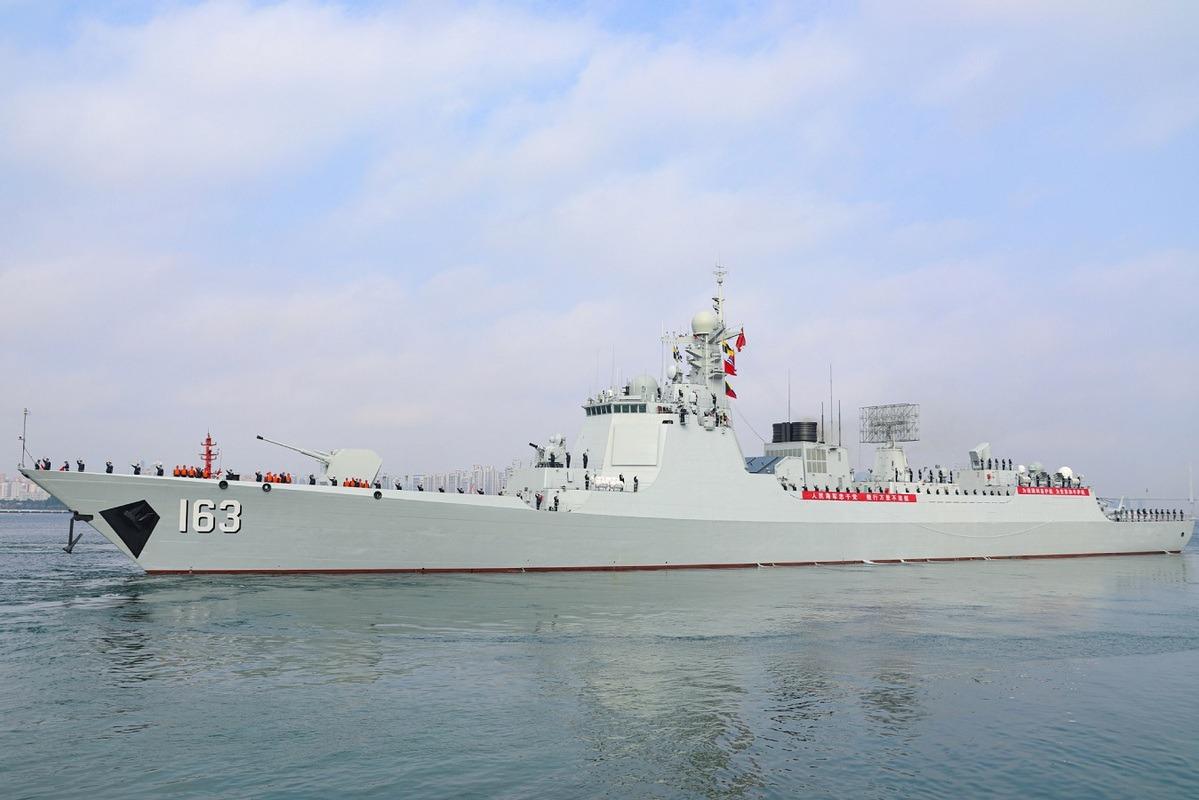 Guided-missile destroyer Jiaozuo of the 46th fleet of the Chinese People's Liberation Army Navy leaves a military port in Zhanjiang, South China's Guangdong province, Feb 21, 2024. The 46th fleet of the Chinese People's Liberation Army Navy on Wednesday set sail from a military port in the coastal city of Zhanjiang in South China's Guangdong province to take over an escort mission from the 45th naval fleet in the Gulf of Aden and the waters off Somalia. (PHOTO / XINHUA)
Guided-missile destroyer Jiaozuo of the 46th fleet of the Chinese People's Liberation Army Navy leaves a military port in Zhanjiang, South China's Guangdong province, Feb 21, 2024. The 46th fleet of the Chinese People's Liberation Army Navy on Wednesday set sail from a military port in the coastal city of Zhanjiang in South China's Guangdong province to take over an escort mission from the 45th naval fleet in the Gulf of Aden and the waters off Somalia. (PHOTO / XINHUA)
As has become the norm in recent years, as soon as it was announced, China's proposed defense budget triggered a furor from some Western media, alleging a lack of transparency.
The Associated Press, for example, has claimed that China's actions are fueling a regional arms race and its military spending is "furthering growth in high-tech military technologies, from stealth fighters to aircraft carriers and a growing arsenal of nuclear weapons", and that the official spending figure "is considered only a fraction" of the country's spending "once spending on research and development and foreign weapons purchases are considered".
Since those are the weapons platforms for modern warfare and deterrence, it is natural that those should be the priorities; muskets and swords are not what a modern military requires. As for the latter claim, the warning about the US military-industrial complex was issued way back in the 1950s, and that nexus is now so deeply embedded in the United States that the country needs to be perpetually at war.
READ MORE: China's defense budget growth set to remain at 7.2 percent
Such deliberate distortions of China's military modernization are of course intended to reinforce the narrative of an aggressive China.
Facts speak louder than words. Compared with the US military spending, China's military expenditure and its pace of increase are no match either in size, in increase rate or in terms of per capita or per service-person.
The US, the world's top military spender, has maintained military spending that is three to four times the size of China's. It recently approved an increase of about 5 percent in its defense budget for 2024, which has reached a staggering $886 billion, accounting for about 40 percent of the total amount of global defense spending. The new budget, hitting a record high again, far exceeds China's.
The Chinese government's proposed defense budget for 2024 is 1.67 trillion yuan, equivalent to about $232 billion, a 7.2 percent year-on-year increase, the same rate as last year and the ninth consecutive year of single-digit growth. Such comparatively low military spending belies the malign intent behind the allegations that Beijing is increasingly "assertive" or even "aggressive".
It does not require any great detective skills to identify who is guilty of such behavior. From Afghanistan to Iraq, from the Ukraine conflict to the Israeli military operations in Gaza, the world's top military spender has waged and engineered wars and resorted to military interventions at will. Warmongering Washington has set the stage for an arms race and is trying to lure others to participate in it.
Japan has approved a hefty 16 percent increase in its military spending for 2024, making it the world's third-largest military spender, behind only the US and China. To cover its real intention to break away from the country's self-defense-only principle, the Japanese government claims that its latest defense budget hike is primarily in response to the growing military threats from countries such as China and Russia.
ALSO READ: Western media's double standard in defense budgets
Last month, Australia unveiled plans to build its largest navy since World War II, allocating more than $35 billion for the defense project over the next 10 years.
With the US viewing China as a strategic rival and forming small cliques to contain and bully it, China is facing a worsening security environment and growing security risks as the US and its allies constantly stoke tensions over the South China Sea and the Taiwan question.
It is only justified that China should allocate funds to ensure it has the means to effectively safeguard its sovereignty and territorial integrity, better respond to various challenges and be better prepared for potential risks and threats on its doorsteps.
But at the same time, the country will continue to contribute to international peacekeeping efforts and remain committed to safeguarding world peace and stability.



